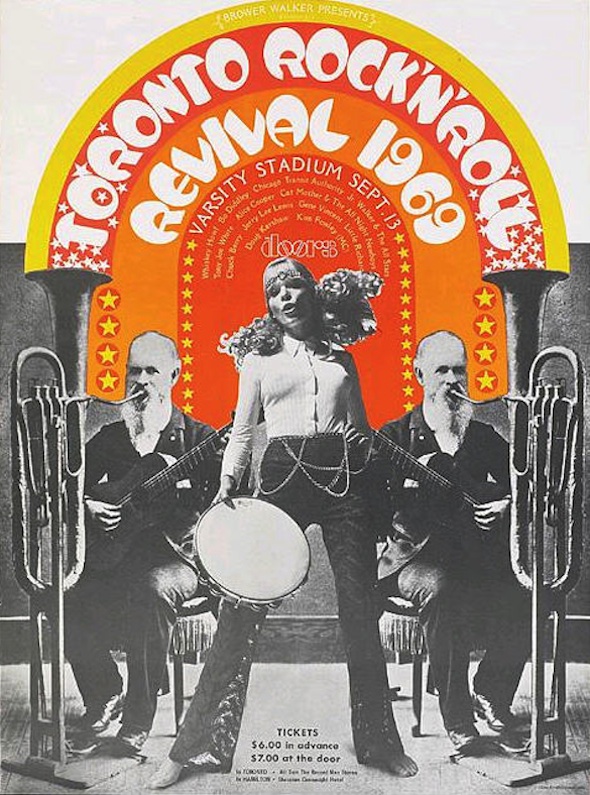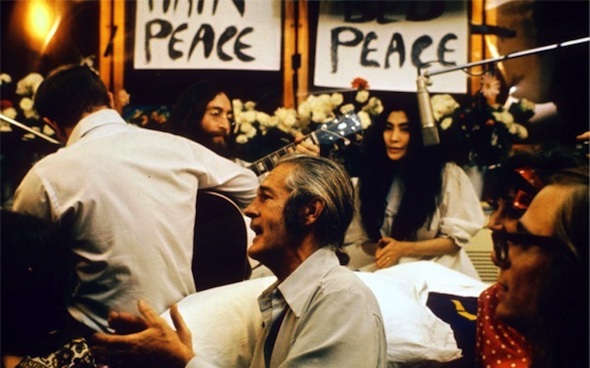![]() Rock and roll was, apparently, dead by the end of the '60s. So much so that legendary performers like John Lennon, Alice Cooper, The Doors, Chuck Berry, and Little Richard needed a special benefit concert to boost its fortunes. Enter "Rock and Roll Revival," a special one-day concert held at Varsity Stadium in the late summer heat of 1969.
Rock and roll was, apparently, dead by the end of the '60s. So much so that legendary performers like John Lennon, Alice Cooper, The Doors, Chuck Berry, and Little Richard needed a special benefit concert to boost its fortunes. Enter "Rock and Roll Revival," a special one-day concert held at Varsity Stadium in the late summer heat of 1969.
The 14-hour extravaganza would see the first public performance by the Plastic Ono Band in the turbulent wake of the Beatles break-up earlier that year. Backed by 1950s-style performances by some of music's biggest names, the concert would generate several live albums, a concert tape by D. A. Pennebaker, the film-maker behind Bob Dylan doc Don't Look Back, and go down as a defining moment in popular culture.
 The concert was conceived by promoters John Brower and Ken Walker with financial backing from top brass from Eaton's department store, but stymied by poor ticket sales, the venture began to lose support. On a recomendation, Brower called Apple Records in the UK to ask John Lennon to emcee the concert, knowing the ex-Beatle would be tempted by the names of several classic rock and roll performers on the bill.
The concert was conceived by promoters John Brower and Ken Walker with financial backing from top brass from Eaton's department store, but stymied by poor ticket sales, the venture began to lose support. On a recomendation, Brower called Apple Records in the UK to ask John Lennon to emcee the concert, knowing the ex-Beatle would be tempted by the names of several classic rock and roll performers on the bill.
In something of a curveball, Lennon agreed to appear on the condition he be allowed to perform. "It was late, about 11 o'clock one Friday night, I was in my office at Apple, when we got a phone call from this guy saying, 'Come to Toronto'," he's quoted as recalling on a fan site. "They really were inviting us as King and Queen to preside over the concert and not to play. But I didn't hear that part and I said, 'OK. OK. Just give me time to get a band together.' So, I thought, 'Who could I get to come and play with me?' We left the next morning."
Just like that the Rock and Roll Revival had scored a major coup. Lennon hadn't performed in a large venue since his days with the Beatles and had no established backing band. Eric Clapton, Klaus Voormann, bass player and designer of the Revolver album cover, future Yes drummer Alan White, and, of course, Yoko Ono at the height of her divisive powers made the trip from London to Toronto a few short months after the famous Give Peace a Chance recording in a Montreal hotel room.
It was such an unbelievable scoop that radio stations in Toronto refused to believe the promoters had landed the band, further stymieing ticket sales. Confirmation shortly after from Ono's assistant to a Detroit radio station caused a stampede for the concert's roughly 20,000 tickets. When wire services confirmed the band had boarded a trans-Atlantic jet, the rush for Revival passes went wild. The tiny sports stadium was sold out in just a few hours.
Meanwhile, in a jet over the ocean, Lennon was having second thoughts. "John was sick from nerves most of the way across the Atlantic," journalist Ritchie Yorke would recall. "'Nerves?' I asked. 'Hell yes,' Lennon replied. 'My God, I haven't performed before a large audience for four years. I mean, I did the Rolling Stones' Circus film with a small audience, and I did the Cambridge '69 gig; but they didn't even know I was coming. So we didn't sleep at all on Friday night, and I was nervous all the way across.'"
Upon landing in Toronto, the band was escorted from the airport by an 80-strong motorcade of bikers from the Vagabonds to Bloor Street. The leather-clad riders had just missed the Doors, who weren't aware they were to be escorted, earlier that day.
At Varsity Stadium, legendary music journalist Robert Christgau was casting his critical eye on the stage set-up. "A bush operation," he called the shabby performance area and stadium floodlights used to provide illumination. Christgau was there to observe D. A. Pennebaker's filming for Show magazine. "Pennebaker is forty-four but looks about thirty-five," the author wrote, "he has recently grown a full red beard and has on an old sweater and his sailing jeans, which are worn to proper sun-bleached blue. Although the natural affability of his boyish face is virtually unchanged, he does appear startled."
Mid-afternoon, as Little Richard jangled away at his piano, The Plastic Ono Band were in a tiny dressing room worrying that this could all be a serious disaster. "I threw up for hours until I went on," remembered Lennon. Eric Clapton told the press later that "John just stood in the dressing room, which was admittedly rather tatty, beforehand saying, 'What am I doing here? I could have gone to Brighton!' After all, it was a long way to go for just one concert."
The group had reached Varsity Stadium earlier that day to an army of flashbulbs and screaming fans as Cat Mother and the All Night Newsboys performed "Good Old Rock and Roll." Kids tried to hop the fence for a better view while police fought to keep the way clear.
After dark, a characteristically wild Alice Cooper set screeched on stage. After a short, heavy intro, the set broke down into mock fighting and drum smashing as Cooper hammered away at a watermelon and tore apart a down pillow in a moment of climax. The most famous chicken in music history appeared from who-knows-where among feathers and fire extinguishing foam for Cooper to toss into the crowd, creating a legend that follows him to this day (the moment is visible for a brief second at 11:37 in the video above.)
And then the band took the stage. The stage announcer ordered that the stadium lights be turned down, and asked the crowd to light a match. A sea of little candles and sparklers filled the playing surface as Lennon and his band emerged on stage. "OK, we're just going to do numbers we know because we've never played before," he told the crowd, launching into a surprisingly lifeless version of Elvis' "Blue Suede Shoes."
It might not have been the barnstorming start the crowd expected but the band soon found their feet. Yoko Ono, dividing her time between backing vocals and music stand duties for Lennon, periodically disappeared into a sack while Clapton and the rest of the band provided a solid backing for the pair.
Versions of "Dizzy Miss Lizzy," "Yer Blues," and "Cold Turkey" followed. Several solo Ono numbers didn't go down so well. "Get the fuck off the stage," called one member of the audience. But that was before the concert's most memorable song, "Give Peace a Chance."
 In July of that year Lennon and Ono had recorded the song live in during their Bed-in at the Queen Elizabeth Hotel in Montreal. The second of two sensational peace protests, an impromptu band featuring Allen Ginsberg, Timothy Leary, Petula Clark, numerous journalists, and well-wishers chanted the now legendary one-line mantra while Lennon egged the crowd on in the background. The piece is still capable of producing chills 43 years later.
In July of that year Lennon and Ono had recorded the song live in during their Bed-in at the Queen Elizabeth Hotel in Montreal. The second of two sensational peace protests, an impromptu band featuring Allen Ginsberg, Timothy Leary, Petula Clark, numerous journalists, and well-wishers chanted the now legendary one-line mantra while Lennon egged the crowd on in the background. The piece is still capable of producing chills 43 years later.
The Varisty Stadium version ditched the acoustic guitar in favor of a choppy, improvised riff by Lennon. Clapton, usually a force with the axe, offered little in the background; it was a one man show. When the song closed, so did the group. Lennon apparently comforted a distressed Ono as they left.
The Doors followed with a headline set just after midnight, closing with "The End" around 3am. In the Monday papers, music critics focused on the still controversial presence of certain members of the band. "They revived rock 'n' roll despite John Lennon's wife," wrote Jack Batten in the Toronto Star, calling Ono "excruciating." Painful or not, the concert was ranked "the second most important event in rock history," for Lennon's first major performance since the Beatles.
Thanks to the wonders of YouTube, you too can share in the magic of that night.
Chris Bateman is a staff writer at blogTO. Follow him on Twitter at @chrisbateman.
Photos: Wikimedia Commons.